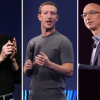
Hmm… distribute the Web for endurance and longevity and make it private through blockchain-esque encryption. It’s an interesting idea, but I don’t know that Marketing will go for it.

Hmm… distribute the Web for endurance and longevity and make it private through blockchain-esque encryption. It’s an interesting idea, but I don’t know that Marketing will go for it.

A beautiful piece on what it means to be a link and what they mean to us.
In the ‘90s, we got tired of systems like Compuserve, AOL and Prodigy that wouldn’t play together nicely and only let us play in pre-approved ways. We might similarly grow disenchanted with apps that don’t connect easily, or only connect in ways that we can’t shape.
So many nice words about such an important piece about the Web. My humble contribution:
John’s piece came three years before Steve Champeon coined the term “progressive enhancement,” but it clearly and succinctly outlined its philosophy: “Make pages which are accessible, regardless of the browser, platform or screen that your reader chooses or must use to access your pages.” His insights—published a mere decade after the invention of the medium—still influence the work I do to this day.

John nails it:
I continue to believe, just as the Web is not print, though it emerged in many ways from the medium of print, it is not just another application platform. It has its own genius, which we could call as I did all those years ago, adaptability.

A nice overview of color and its emotional impact. Of course, this is a Western perspective. See also Cultural Meanings of Color and Color Symbolism.

So the 9th Circuit Court threw out an ADA suit against Netflix for a lack of captions. To Joe Mullin of Ars it seemed like a question of whether a website constitutes a “public accommodation”, but I don’t know that it does in this instance. I did agree with NFB v. Target, but this seems different.
I don’t think Netflix should have to provide captions for all content on its service. The onus for captioning should be on the content creator and not the delivery service. In other words, if Netflix has an accessible site and captions their own original content, that should be the most anyone could ask of them. They don’t own the majority of their content and could even be legally precluded from captioning it depending on the contract.
As much as I want to see more captioned content made available, I think the ruling makes sense. The case doesn’t seem to be appropriately grounded nor does the ask seem reasonable.

A fantastic op-ed by Fareed Zakaria on why a well-rounded populace is a good thing:
A broad general education helps foster critical thinking and creativity. Exposure to a variety of fields produces synergy and cross fertilization. Yes, science and technology are crucial components of this education, but so are English and philosophy.
And on innovation for the future of the U.S.:
Innovation is not simply a technical matter but rather one of understanding how people and societies work, what they need and want. America will not dominate the 21st century by making cheaper computer chips but instead by constantly reimagining how computers and other new technologies interact with human beings.
I could not agree more. I studied pop culture and journalism in college after changing majors from marine biology my third year. I now have a very successful career in the STEM world, but I’ve never taken a computer science course. Heck, I’ve never even taken a typing course.
(I kinda regret that second one.)
I don’t think I would be where I am today if I did not spend time in psychology, sociology, literature, drama, and anthropology classes. It’s not that a computer science course or two wouldn’t have helped me (it certainly would have), but broad exposure leads to broad perspectives and innovative thinking. It helps us see the interconnectedness of what surrounds us and helps us do our jobs better, no matter what our jobs are.
Fareed makes a lot of great points in this op-ed and you should definitely give it a read, but I will leave you with this important warning:
Americans should be careful before they try to mimic Asian educational systems, which are oriented around memorization and test-taking. I went through that kind of system. It has its strengths, but it’s not conducive to thinking, problem solving or creativity. That’s why most Asian countries, from Singapore to South Korea to India, are trying to add features of a liberal education to their systems.
Connect to Internet Explorer via Chrome Developer Tools. How friggin’ cool is that?!

D.C. gets a downgrade for its myopic, “modern”, JavaScript-only focus:
While the site is easy enough to navigate by a person with good vision using a modern browser, the complete reliance on Javascript makes it extremely difficult for people with older technology or individuals relying on assistive devices to use the site.

A heartbreaking and damning assessment of the current state of Unicode by Aditya Mukerjee.
My name is not only a common Indian name, but one of the top 1,000 names in the United States as well. But the final letter has still not been given its own Unicode character, so I have to use a substitute.
Wow. Just, wow.
Worried about Unicode getting too big?
[O]ne might appeal to the limited space in the Unicode character set. Even if we take for granted the somewhat arbitrary maximum of 1,114,112 codepoints, the other alphabets included speak for themselves. The most recent update to the Unicode standard included the entire alphabet of Linear B, an ancient Mycenaean script that was not deciphered in the modern era until the 1950s. Nor does alleged scarcity explain the inclusion of Linear A, a Minoan script so arcane, scholars disagree on what language it even represented, let alone how to read the script.
His frustration is completely understandable:
We have an unambiguous, cross-platform way to represent “PILE OF POO” (💩), while we’re still debating which of the 1.2 billion native Chinese speakers deserve to spell their own names correctly.
And since the subject of diversity in emoji has been a hot button issue of late, here’s a bit on that:
Perhaps I wouldn’t mind that the emoji world now literally has “colored” people, if it weren’t for the timing. Instead, what could have been a meaningless, empty gesture becomes an outright insult. You can’t write your name in your native language, but at least you can tweet your frustration with an emoji face that’s the same shade of brown as yours!
This post is eye-opening on so many levels. You should definitely add it to your reading list because, as Aditya reminds us, “it’s imperative that the writing system of the 21st century be driven by the needs of the people using it.”